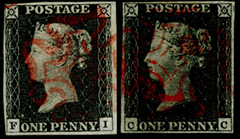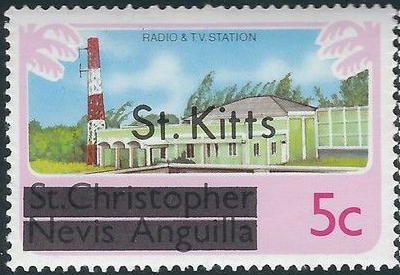 First Issues Collectors Club
of stamps and philatelic material
First Issues Collectors Club
of stamps and philatelic material
Home - Catalog - Categories - Index - Journal - Exhibits - Auctions - Forgeries - Join
 First Issues Collectors Club
of stamps and philatelic material
First Issues Collectors Club
of stamps and philatelic material
Home - Catalog - Categories - Index - Journal - Exhibits - Auctions - Forgeries - Join
| first issues > countries > st. christopher (st. kitts) |
| British Colony | 29 | ||
| Caribbean | 24 |
perf 12, crown wmk, typographed
Printed by De La Rue, London
| Description | Date issued | Scott# | SG# | Mi# | Y&T# | |
|---|---|---|---|---|---|---|
| 1 penny dull rose | 1870 | 1 | 1 | |||
| 1d lilac rose | 1870 | 2 | 2 | 1871 and described as 'magenta and shades' in Gibbons | ||
| 6d green | 1871 | 3 | 5 | |||
| 6d yellow-green | 1870 | 3a | 4 |
There is no SG3
St. Christopher used British stamps (and an A12 obliterator) from 1858 until 1860, used a handstamp for 10 years then, in 1870 issued 1d (inland) and 6d (to Britain) stamps. Mackay [1] writes affectionately but acerbically,
"The stamps of St. Christopher were typographed by De La Rue, rapidly approaching that point of virtual monopoly in British and colonial stamp production which they were to enjoy unassailed for more than forty years.
Significantly, the design of the St. Christopher stamps was a foretaste of things to come. Not only was there no attempt to provide different frames for the different denominations (as De La Rue had previously done for other colonies) but the design itself was suspiciously like those used for Lagos (1874) and Tobago (1879). In a sense this simple but adaptable design was the forerunner of the long range of colonial keyplates which were the dreary hallmark of British colonial stamps in the middle period (1880-1920). Uniformity and economy were achieved at the expense of interest and variety. But that era of monotony was still far off when the classic period drew to its close." [Mackays book covers the period 1840-1870.]
 |
| 1980 Sc25 SG29B |
St. Christopher blends into Nevis (1861) and St. Kitts-Nevis (1903) and eventually St. Christopher, Nevis and Anguilla (1952), separating again into three constituent parts in 1980, probably to generate greater stamp sales.
Sources: JM1 [1] , ScC, SGP1.
Images from David Olson.
| Page created 26 Jan 2016 | Page updated 19-Aug-2017 |